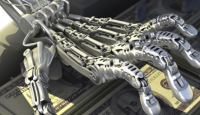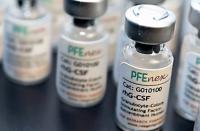-
Apple's encryption prevents it from complying with U.S. court order
Apple said it could not comply with a court order to hand over texts sent using iMessage between two iPhones because the company’s encryption system makes it impossible to do so. The Justice Department persuaded the court to issue the order to facilitate an investigation involving guns and drugs. Legal experts say this is the first known direct face-off between the U.S. government and Apple over encryption. The FBI contends that such encryption puts the American public at risk because it makes it harder, if not impossible, to track and catch terrorists, pedophiles, and other criminals.
-
-
Strategic alliance to deliver behavioral analysis cybersecurity to market
Ernst & Young LLP and Los Alamos National Laboratory have formed a strategic alliance to deliver what they describe as some of the most advanced behavioral cybersecurity tools available to the commercial market. The alliance comes at a watershed moment when increasingly sophisticated cyberattacks are inflicting significant economic, social, and even political damage to U.S. organizations. The tools developed by Los Alamos and delivered to the private sector by Ernst & Young LLP can help counter these threats by detecting them before they do deep and lasting damage.
-
-
DHS S&T awards $10.4 million in mobile security research contracts
The mobile technology industry has continuously expanded with new devices and apps, allowing people to simplify how and where business is conducted. While increasing the use of mobile technology can enhance productivity, improved security is needed to ensure that sensitive information is not at risk to current and emerging cyber threats. DHS S&T the other day announced $10.4 million in cybersecurity Mobile Technology Security (MTS) research and development (R&D) awards to enhance the security of mobile devices for the federal government.
-
-
Federally funded network anomaly-detection technology licensed to Ernst & Young
The Transition to Practice (TTP) program, established in 2012 as part of S&T’s Cybersecurity Division, looks to transition federally funded cybersecurity technologies from the laboratory to enterprise consumers. S&T the other day announced that the PathScan technology, a network anomaly-detection tool developed by Los Alamos National Laboratory, has been licensed to Ernst & Young LLP (EY).
-
-
TSA deploys AtHoc crisis communication solution in 200 airports
TSA joins the Customs and Border Protection (CBP) and Immigration and Customs Enforcement (ICE) in deploying AtHoc to improve crisis communication in 200 U.S. airports. TSA’s Alert Warning System (AWS), based on AtHoc, will enable real-time accountability of TSA staff during routine, emergency, and critical events.
-
-
Wearable device helps medics save lives in disasters, on the battlefield
The First Response Monitor is a wearable device designed to measure and monitor the vital signs of multiple trauma patients for emergency response in disasters and battlefield situations. The device has been primarily designed with first response medics in mass casualty incidents in mind, but it has applications in many other fields — such as civilian medicine where additional monitoring of conditions has benefit in patient outcomes, wellness monitoring, and within sports for training and performance monitoring.
-
-
Nuclear weapons workers at DOE Texas plant vote to strike
Workers at Consolidated Nuclear Security Pantex in Amarillo, Texas are responsible for the nuclear weapons life extension programs; weapons dismantlement; development, testing, and fabrication of high explosives components; and storage and surveillance of plutonium pits. On Friday, after more than seven months at the bargaining table with CNS Pantex, 87 percent of the unionized workers at the Amarillo facility voted to strike.
-
-
Draft guide to help energy companies reduce cyber risk

DHS reported that 5 percent of the cybersecurity incidents its Industrial Control Systems Cyber Emergency Response Team responded to in fiscal year 2014 were tied to weak authentication. Four percent were tied to abuse of access authority. The National Cybersecurity Center of Excellence (NCCoE) is requesting comments on a draft guide to help energy companies better control who has access to their networked resources, including buildings, equipment, information technology, and industrial control systems.
-
-
Interactive tool roots discussions about the cost of nuclear energy in hard evidence

Despite the ever-changing landscape of energy economics, subject to the influence of new technologies and geopolitics, a new tool promises to root discussions about the cost of nuclear energy in hard evidence rather than speculation. Over the last two years, the Bulletin of the Atomic Scientists has developed the Nuclear Fuel Cycle Cost Calculator, an online interface that provides a nuanced look at the economic costs of nuclear power. The calculator provides a simple gateway into the physics-laden universe of nuclear economics. A user can slide more than sixty moving scales to tweak inputs like uranium price or reactor construction time, and then watch the expected price shift.
-
-
U.S. coastal flood risk on the rise ten years after Hurricane Katrina
A decade after Hurricane Katrina caused $41 billion in property and casualty insurance losses, the most expensive catastrophe ever experienced by the global insurance industry, rising sea levels are driving up expected economic and insurance losses from hurricane-driven storm surge in coastal cities across the United States. Rising sea levels contributing to increased risk of severe economic damage from flood following a hurricane – and Miami, New York, and Tampa now face greater risk than New Orleans.
-
-
Security check firm USIS accepts $30 million fraud settlement
United States Investigations Services, the security firm which vetted Edward Snowden, has agreed to a fine of about $30 million to settle U.S. charges related to the way it conducted background checks on applicants for sensitive government jobs. The Justice Department said USIS engaged in practice internally called “dumping” or “flushing,” in which the company released the background checks of individuals to the U.S. Office of Personnel Management (OPM) and presented these cases as having been completed when, in fact, they were not.
-
-
Pfenex awarded contract valued at up to $143.5 million to develop anthrax vaccine

San Diego, California-based Pfenex Inc. the other day announced it has signed a five year, cost plus fixed fee contract valued at up to $143.5 million with the Biomedical Advanced Research and Development Authority (BARDA) of the Department of Health and Human Services (HHS), for the advanced development of Px563L, a mutant recombinant protective antigen anthrax vaccine. The company says the U.S. government is looking to have a stockpile of seventy-five million doses.
-
-
New technology solves city pipelines leakage problem without excavation

In Mexico City there are twenty-six thousand kilometers of water pipes and drainage, of which about 8,000 are useless, with risk of collapse and resulting cuts in service. The water pipes infrastructure of many other cities is not much better. A Mexican start-up has created a technology to renew piping without the need for excavation, ensuring it lasts fifty years, twice as long as traditional piping.
-
-
EB-5 foreign investor visa program susceptible to fraud, misuse: GAO
The United States has launched dozens of investigations into fraudulent practices in a program, called EB-5, which grants Green Cards to foreigners who invest $500,000 in selected U.S. ventures. A GAO report notes that the program is vulnerable to fraud, because many of the applicants care less about the success of the venture in which they invest and more about getting the Green Card, and can easily afford to lose $500,000 in order to get the card.
-
-
U.S. Navy champions unmanned systems over, on, and under the sea
The presence of unmanned systems in the maritime military domain is growing, and the U.S. Navy has decided to make several organizational, and conceptual, changes in order to deal with unmanned systems in a more holistic fashion. Rear Adm. Robert P. Girrier has been named the Navy’s first director of unmanned weapon systems, and Secretary of the Navy Ray Mabus announced in April that he would appoint a new Deputy Assistant Secretary of the Navy for Unmanned Systems, “so that all aspects of unmanned — in all domains — over, on and under the sea and coming from the sea to operate on land — will be coordinated and championed.”
-
More headlines
The long view
Factories First: Winning the Drone War Before It Starts
Wars are won by factories before they are won on the battlefield,Martin C. Feldmann writes, noting that the United States lacks the manufacturing depth for the coming drone age. Rectifying this situation “will take far more than procurement tweaks,” Feldmann writes. “It demands a national-level, wartime-scale industrial mobilization.”
Trump Is Fast-Tracking New Coal Mines — Even When They Don’t Make Economic Sense
In Appalachian Tennessee, mines shut down and couldn’t pay their debts. Now a new one is opening under the guise of an “energy emergency.”
Smaller Nuclear Reactors Spark Renewed Interest in a Once-Shunned Energy Source
In the past two years, half the states have taken action to promote nuclear power, from creating nuclear task forces to integrating nuclear into long-term energy plans.
